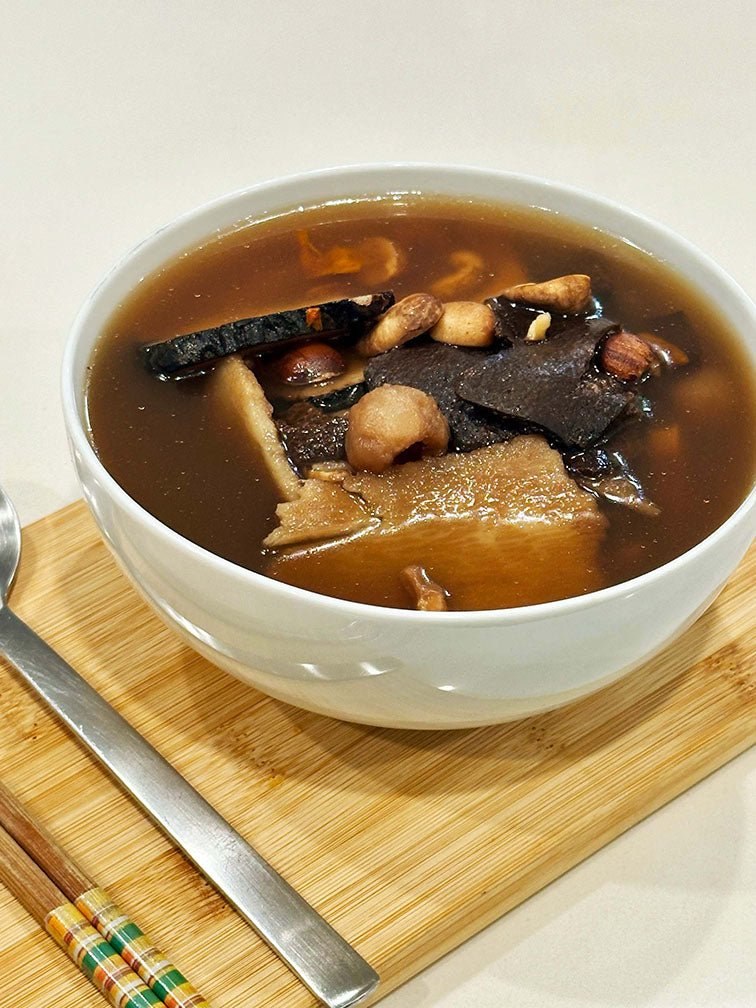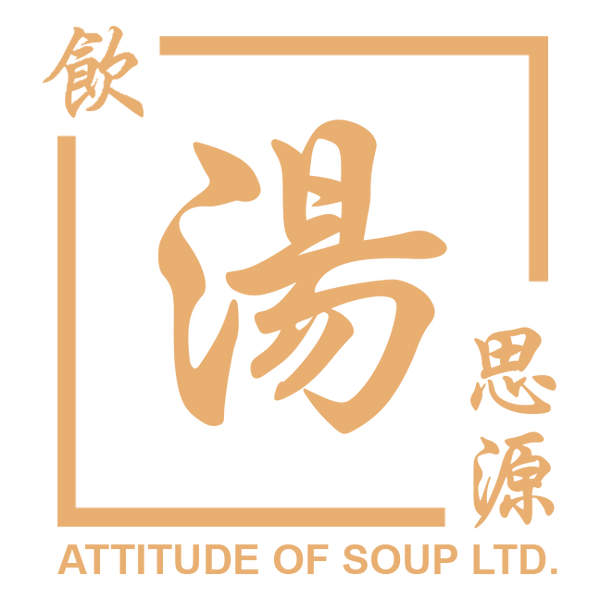REFRESH | Light, Crisp & Comforting
TANGERINE PEEL, PORIA & LOTUS SEED SOUP
TANGERINE PEEL, PORIA & LOTUS SEED SOUP
Couldn't load pickup availability
Gentle Citrus Aroma · Calm & Comforting
A light and refreshing Hong Kong–style Chinese herbal soup mix featuring Tangerine Peel (Chenpi) (陳皮), Poria (Fushen) (茯神), and Lotus Seed (蓮子). The gentle citrus aroma and smooth flavor bring a sense of calm and balance, perfect for quiet moments of relaxation.
Made in Canada with carefully selected dried ingredients, this easy-to-cook soup mix offers a simple, comforting way to unwind and enjoy the soothing taste of home.
Cooking Method:
Rinse ingredients lightly. Add about 1.2 L of water, bring to a boil, then simmer for around 2 hours. Season to taste. Suitable for stovetop, pressure cooker, or vacuum-insulated jar cooking.
This is a soup ingredient pack that lets you easily cook and enjoy authentic nourishing Chinese soup at home anytime!
Ingredients
Ingredients
Poria (Fushen), Lotus Seed, Cashew, Dried Lily Bulb, Dried Chinese Yam, Goji Berry, Dried Tangerine Peel (Chenpi), Dried Longan
Contains: Tree Nuts (Cashew)
Suitable For
Suitable For
.Perfect for anyone who wants an easy way to enjoy authentic Hong Kong style Chinese soup at home whether you’re new to cooking, living a busy lifestyle, or simply looking for a cozy family meal.
.Suitable for vegetarians.
.Suitable for consumption during pregnancy, especially the early stages of pregnancy.
Method and Serving Size
Method and Serving Size
Simply rinse the ingredients, place them in a pot, and add water (recommended 1.2 liters). Bring it to a boil over high heat, then change to the lowest heat setting of the smallest stove and simmer for 2 hours. Using the recommended amount of water can yield two large bowls or four regular-sized servings of soup, suitable for a small family.
Other Cooking Methods
Other Cooking Methods
.Cooking Soup with an Instant Pot
Simply rinse the ingredients, place them in the Instant Pot, and add 1.2 liters of water. Set the pot to the Soup mode and cook for 1 hour. After releasing the pressure, you can switch to Sauté mode and simmer for an additional 15 minutes for a richer flavor. This amount of water will yield two large bowls or four regular-sized servings of soup, perfect for a small family.
.Steeping Soup in a Vacuum Insulated Food Jar
Simply rinse the ingredients, place them in a vacuum insulated food jar (recommended size: 750ml), and fill it with hot water. Let it steep for about 4 hours.
Optional Add-on
Optional Add-on
Since the soup is already flavored by the ingredients, there is no need to add additional meat or seasoning when cooking the soup. If you want the soup to be thicker, you can add: Blanched Lean Meat / Blanched Pork Ribs / Corn / Carrot
Storage and Best Before
Storage and Best Before
Please keep in a cool dry place or refrigerator. Avoid high temperature and humidity, or direct sunlight. Recommended to consume within 12 months.
Country of Origin and Packaging
Country of Origin and Packaging
British Columbia, Canada
- Vacuum-sealed: Safe, hygienic, easy to store
- Free shipping: $75+ (Greater Vancouver), $99+ (Canada-wide)
- Sending as a gift? Add a free personalized message card!
The amount of ingredients in the picture is for reference only, the actual amount will be adjusted according to the prepared soup recipe
Share



How to consume soup packet
Learn more about the key Chinese herbs and other traditional ingredients in this soup mix
What is Dried Tangerine Peel (Chen Pi) (陳皮)?
Dried Tangerine Peel, known as Chen Pi, is made from the peel of fully ripened citrus fruits — typically tangerines or the Guangdong variety known as Guang Chen Pi — which are sun-dried or air-dried to preserve their aroma.
Once dried, the peel turns golden to deep brown, with a lightweight texture and a natural citrus fragrance.
It is widely used in Chinese soups and Cantonese cooking. With its distinct citrus aroma and subtly sweet aftertaste, dried tangerine peel enhances the depth and brightness of soups and stews. It is one of the most common dried ingredients in Hong Kong–style soups and home-cooked nourishing dishes.
Characteristics
According to records in Traditional Chinese Medicine (TCM), Dried Tangerine Peel is pungent and slightly bitter in flavor, and warm in nature. It is traditionally known to help regulate qi (vital energy), support digestion, and balance internal moisture.*
When simmered, it releases a rich, natural citrus fragrance that gives soups a smoother, lighter finish while helping to offset the heaviness of meats and beans.
Cooking and Pairing Suggestions
- Soups / Stews: Dried Tangerine Peel is often simmered with Poria (Fu Shen), creating a delicately fragrant and full-bodied soup. It is also used with winter melon and duck leg in the classic Cantonese dish Winter Melon and Duck Soup with Dried Tangerine Peel.
- Desserts / Sweet Soups: Often paired with red beans, lotus seeds, and lily bulbs to make Red Bean Sweet Soup with Lotus Seed, Lily Bulb & Tangerine Peel Glutinous Balls — aromatic, smooth, and pleasantly sweet. (Check out the easy recipe for Red Bean Sweet Soup with Tangerine Peel and Lotus Seed.)
- Braised Dishes / Home-Style Cooking: Can be stewed with pork ribs, beef brisket, or tofu to balance oiliness and elevate the overall aroma and flavor profile.
Interesting to Know
The word “陳” (Chen) in Chen Pi literally means “aged” — the longer it is stored, the richer and more mellow its fragrance becomes.
In Cantonese culture, there’s a saying: “An ounce of aged tangerine peel is worth an ounce of gold,” reflecting its value as both a seasoning and a traditional food ingredient.
In Hong Kong–style soup culture, Dried Tangerine Peel is considered the soul of flavor balance — enhancing aroma, reducing heaviness, and bringing out the natural taste of ingredients.
*Source: Hong Kong Baptist University Chinese Medicinal Material Images Database. The above information is cited from traditional references and provided for general ingredient knowledge only.
What is Poria with Hostwood (Fu Shen) (茯神)?
Poria (Fu Shen) refers to the inner portion of the fungus Poria cocos that grows together with pine roots. It is a well-known dried ingredient in Hong Kong–style soups and nourishing home recipes.
The fungus naturally develops on pine roots underground and forms a solid sclerotium. The central part that contains the pine root is sliced and dried to make what is known as “Poria with Hostwood” (Fu Shen).
Its appearance is light brown or grayish-white, with a firm texture and a mild, pleasant aroma. Compared with ordinary Poria (Fu Ling), Fu Shen has a denser texture and a slightly richer woody fragrance, making it a popular ingredient in gentle, comforting soups.
Characteristics
According to records in Traditional Chinese Medicine (TCM), Poria (Fu Shen) is sweet in taste and neutral in nature. It has traditionally been used to harmonize the body and promote calmness.*
When simmered, it releases a delicate, natural aroma and gives soups a smooth, mellow mouthfeel. It is commonly used in light evening soups or everyday nourishing broths for its mild flavor and soothing fragrance.
Cooking and Pairing Suggestions
- Soups / Stews: Often paired with dried tangerine peel, fox nuts, or lotus seeds to create a naturally aromatic and balanced broth.
- Home Use: Suitable for daily soup recipes, especially those meant for relaxation and comfort after a long day.
Interesting to Know
Fu Shen and Fu Ling both come from the same fungus (Poria cocos), but they differ in how they are harvested:
- Fu Ling (Poria): The outer white sclerotium — softer in texture with a mild aroma.
- Fu Shen (Poria with Hostwood): The inner portion that includes the pine root — firmer and more aromatic, regarded as the more refined part.
In some Hong Kong–style soups, Fu Ling and Fu Shen may be used together to combine their distinct textures and subtle herbal aromas, resulting in a broth that tastes clear yet full-bodied.
*Source: Hong Kong Baptist University Chinese Medicinal Material Images Database. The above information is cited from traditional references and provided for general ingredient knowledge only.
What is Lotus Seed (蓮子)?
Lotus seeds are the mature seeds of the lotus plant (Nelumbo nucifera), a member of the water-lily family. They are a common ingredient in Hong Kong–style soups and traditional Chinese desserts. Harvested from lotus pods, the seeds are peeled, de-germed, and dried to create dried lotus seeds that are convenient for long-term storage and easy to cook. Dried lotus seeds are round, firm, and ivory-white to pale yellow in color. When cooked, they become soft, smooth, and mildly sweet with a subtle floral aroma.
Characteristics
According to records in Traditional Chinese Medicine (TCM), lotus seeds are sweet and astringent in taste and neutral in nature. They are traditionally believed to help strengthen the spleen, support kidney function, and calm the heart and mind.*
Dried lotus seeds have a gentle sweetness and delicate texture. When simmered, they add a naturally pleasant aroma and a smooth mouthfeel to soups and desserts, making them a popular base ingredient in Hong Kong–style soup mixes and sweet soups.
Cooking and Pairing Suggestions
- Soups / Stews: Lotus seeds are often cooked with lily bulbs, red dates, polygonatum root, or Chinese yam to create naturally sweet, comforting soups.
- Sweet Soups / Desserts: They can be used in a variety of Cantonese desserts such as Mulberry Mistletoe Lotus Seed Tea with Egg — a mildly fragrant, naturally sweet herbal tea - see easy recipe of Mulberry Mistletoe (Sang Ji Sheng) Lotus Seed Egg Tea, or Tangerine Peel Red Bean Glutinous Rice Balls with Lotus Seed and Lily Bulb, rich in aroma and texture yet pleasantly light - see easy recipe of Chenpi Lotus Seed Dried Lily Bulb Red Bean Tangyuan.
Interesting to Know
In Chinese culture, lotus seeds symbolize fertility, harmony, and everlasting happiness — often referred to as “lián shēng guì zǐ” (連生貴子), meaning “may you be blessed with noble children.”
They are frequently served with red dates and dried longan in wedding desserts or celebratory sweet soups, symbolizing blessings for love, harmony, and family joy. Their round, tender texture and gentle sweetness have made lotus seeds a beloved ingredient representing good fortune and happiness.
*Source: Hong Kong Baptist University Chinese Medicinal Material Images Database. The above information is cited from traditional references and provided for general ingredient knowledge only.
陳皮理氣,茯神安神,蓮子清心,百合潤肺,一包湯料,可以潤燥寧神,正!
感謝您的好評!很高興聽到您對這款湯包的成分和效果感到滿意。☺️陳皮、茯神、蓮子和百合的搭配不僅美味,還能潤燥寧神,讓您獲得健康與舒適。期待您再次光臨,享受更多的健康湯品!❤️
Why You'll Love This Soup Packet
-

NOURISHING & HEALTH-BOOSTING
Carefully blended Chinese herbal ingredients to support your wellness goals.
-

CONVENIENT & TIME-SAVING
Ready-to-cook packets with simple instructions—just add water & simmer!
-

SAFE, FRESH & HYGIENIC
Individually vacuum-sealed to lock in freshness.
-

PERFECTLY PORTIONED
Designed for small families (2 large bowls / 4 regular bowls) to prevent waste.








